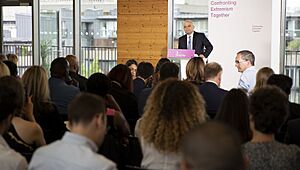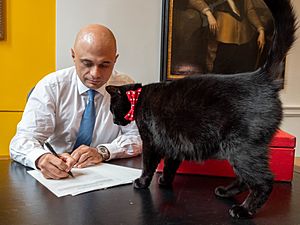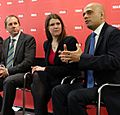Sajid Javid facts for kids
Quick facts for kids
Sir Sajid Javid
|
|||||||||||||||||||||||||
|---|---|---|---|---|---|---|---|---|---|---|---|---|---|---|---|---|---|---|---|---|---|---|---|---|---|
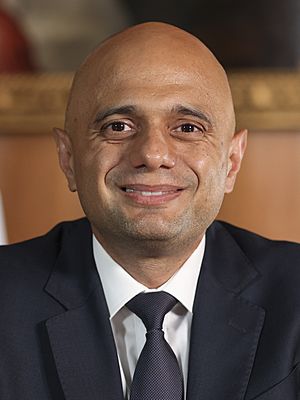
Official portrait, 2021
|
|||||||||||||||||||||||||
| Chancellor of the Exchequer | |||||||||||||||||||||||||
| In office 24 July 2019 – 13 February 2020 |
|||||||||||||||||||||||||
| Prime Minister | Boris Johnson | ||||||||||||||||||||||||
| Preceded by | Philip Hammond | ||||||||||||||||||||||||
| Succeeded by | Rishi Sunak | ||||||||||||||||||||||||
| Secretary of State for Health and Social Care | |||||||||||||||||||||||||
| In office 26 June 2021 – 5 July 2022 |
|||||||||||||||||||||||||
| Prime Minister | Boris Johnson | ||||||||||||||||||||||||
| Preceded by | Matt Hancock | ||||||||||||||||||||||||
| Succeeded by | Steve Barclay | ||||||||||||||||||||||||
| Home Secretary | |||||||||||||||||||||||||
| In office 30 April 2018 – 24 July 2019 |
|||||||||||||||||||||||||
| Prime Minister | Theresa May | ||||||||||||||||||||||||
| Preceded by | Amber Rudd | ||||||||||||||||||||||||
| Succeeded by | Priti Patel | ||||||||||||||||||||||||
| Secretary of State for Housing, Communities and Local Government | |||||||||||||||||||||||||
| In office 13 July 2016 – 30 April 2018 |
|||||||||||||||||||||||||
| Prime Minister | Theresa May | ||||||||||||||||||||||||
| Preceded by | Greg Clark | ||||||||||||||||||||||||
| Succeeded by | James Brokenshire | ||||||||||||||||||||||||
| In office 12 May 2015 – 13 July 2016 |
|||||||||||||||||||||||||
| Prime Minister | David Cameron | ||||||||||||||||||||||||
| Preceded by | Vince Cable | ||||||||||||||||||||||||
| Succeeded by | Greg Clark | ||||||||||||||||||||||||
| Secretary of State for Culture, Media and Sport | |||||||||||||||||||||||||
| In office 9 April 2014 – 11 May 2015 |
|||||||||||||||||||||||||
| Prime Minister | David Cameron | ||||||||||||||||||||||||
| Preceded by | Maria Miller | ||||||||||||||||||||||||
| Succeeded by | John Whittingdale | ||||||||||||||||||||||||
| Minister for Equalities | |||||||||||||||||||||||||
| In office 9 April 2014 – 15 July 2014 |
|||||||||||||||||||||||||
| Prime Minister | David Cameron | ||||||||||||||||||||||||
| Preceded by | Maria Miller | ||||||||||||||||||||||||
| Succeeded by | Nicky Morgan | ||||||||||||||||||||||||
|
|||||||||||||||||||||||||
|
|||||||||||||||||||||||||
| In office 6 May 2010 – 30 May 2024 |
|||||||||||||||||||||||||
| Preceded by | Julie Kirkbride | ||||||||||||||||||||||||
| Succeeded by | Bradley Thomas | ||||||||||||||||||||||||
| Personal details | |||||||||||||||||||||||||
| Born | 5 December 1969 Rochdale, Lancashire, England |
||||||||||||||||||||||||
| Political party | Conservative | ||||||||||||||||||||||||
| Spouse |
Laura King
(m. 1997) |
||||||||||||||||||||||||
| Children | 4 | ||||||||||||||||||||||||
| Residences | |||||||||||||||||||||||||
| Education |
|
||||||||||||||||||||||||
| Alma mater | University of Exeter (BA) | ||||||||||||||||||||||||
| Occupation |
|
||||||||||||||||||||||||
| Signature |  |
||||||||||||||||||||||||
Sir Sajid Javid (born 5 December 1969) is a British former politician. He held several important government jobs, known as Great Offices of State. These included Home Secretary from 2018 to 2019 and Chancellor of the Exchequer from 2019 to 2020. He was also the Secretary of State for Health and Social Care from 2021 to 2022.
Javid was a member of the Conservative Party. He served as the Member of Parliament (MP) for Bromsgrove from 2010 until 2024.
Born in Rochdale, Lancashire, to a British Pakistani family, Javid grew up mostly in Bristol. He studied Economics and Politics at the University of Exeter. Before politics, he had a successful career in banking at Deutsche Bank.
In 2018, he became the first British Asian to hold one of the Great Offices of State when he was appointed Home Secretary. He later ran for leader of the Conservative Party in 2019 but was not successful. The winner, Boris Johnson, made him Chancellor of the Exchequer. Javid resigned from this role in 2020.
In 2021, Javid returned to the government as Health Secretary. He played a key role in the UK's response to the COVID-19 pandemic. He resigned in July 2022, which helped lead to Prime Minister Boris Johnson's own resignation. Javid did not run for re-election as an MP in the 2024 general election.
Contents
Early Life and Education
Sajid Javid was born on 5 December 1969 in Rochdale, Lancashire. He was one of five sons. His parents were from Pakistan and moved to the United Kingdom in the 1960s. His father worked as a bus driver. The family later moved to Bristol, where they lived in a flat above a shop they owned.
As a teenager, Javid became interested in finance. He has said that at age 14, he borrowed £500 from a bank to invest in shares. He attended Downend School, a state school near Bristol. He said that as a child, he faced racial insults.
After school, he went to Filton College and then the University of Exeter. At university, he studied economics and politics and joined the Conservative Party.
Career Before Politics
After graduating, Javid worked in banking for 18 years. He started at Chase Manhattan Bank in New York City. He later moved back to London and joined Deutsche Bank in 2000.
At Deutsche Bank, he became a managing director. In 2007, he moved to Singapore to lead several of the bank's businesses in Asia. He left banking in 2009 to start a career in politics. His job in banking paid very well, and becoming a politician meant a large pay cut.
Political Career
Becoming a Member of Parliament
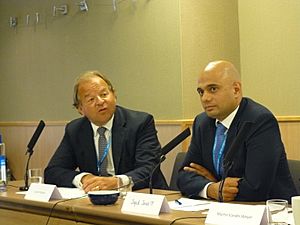
In 2010, Javid was elected as the Member of Parliament for Bromsgrove. He won the election with a large number of votes. He was re-elected several times, increasing his majority in the 2019 election.
Many people saw Javid as a rising star in the Conservative Party. He was named "Newcomer of 2010" by the ConservativeHome blog. Over the years, newspapers and magazines suggested he could one day become Prime Minister.
Early Government Roles
Javid quickly moved up in the government. In 2011, he became a private secretary to George Osborne, who was the Chancellor of the Exchequer. This is an important job helping a senior minister.
In 2012, he became the Economic Secretary to the Treasury. A year later, he was promoted to Financial Secretary to the Treasury. In these roles, he helped manage the UK's economy.
Culture Secretary
In April 2014, Prime Minister David Cameron appointed Javid to his Cabinet as Secretary of State for Culture, Media and Sport. The Cabinet is a group of the most important government ministers. This made him the first MP from the 2010 election to join the Cabinet.
As Culture Secretary, he defended the freedom of the press. He also spoke about the importance of diversity in culture.
Business Secretary
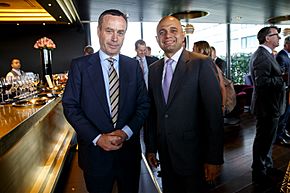
After the 2015 general election, Javid became the Secretary of State for Business, Innovation and Skills. In this role, he announced changes to laws about strikes.
During the 2016 EU referendum, Javid supported the campaign for the UK to remain in the European Union. He said that being part of the EU's Single Market was good for Britain.
Communities Secretary
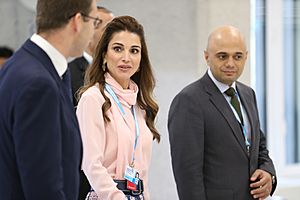
In July 2016, Prime Minister Theresa May made Javid the Secretary of State for Communities and Local Government. His main goal was to increase the number of new homes being built. This included more affordable houses and council houses.
He also worked on reforming leasehold laws. This was to help people who owned flats but not the land they were built on. His work aimed to protect them from unfair fees.
The Great Offices of State
The Great Offices of State are the four most senior and respected posts in the British government. Javid has held two of these positions.
Home Secretary
On 30 April 2018, Javid was appointed Home Secretary. This role is in charge of immigration, policing, and national security. He became the first person of Asian background to hold one of the Great Offices of State.
As Home Secretary, Javid dealt with the Windrush scandal, where some British citizens were wrongly treated as illegal immigrants. He promised to fix the injustices. He also lifted the limit on the number of doctors and nurses who could come to the UK from other countries.
In February 2019, he made the decision to remove the British citizenship of Shamima Begum, a teenager who had left the UK to join the terrorist group ISIS. This decision was supported by many people but also faced criticism.
Chancellor of the Exchequer
On 24 July 2019, Prime Minister Boris Johnson appointed Javid as Chancellor of the Exchequer. The Chancellor is the government's chief financial minister, responsible for the UK's economy.
As Chancellor, Javid prepared the country for leaving the EU, known as Brexit. He supported Johnson's plan to leave the EU on 31 October 2019, with or without a deal. He also unveiled a special 50p coin to mark the date of Brexit.
Why did he resign?
Javid resigned as Chancellor on 13 February 2020. This was during a government reshuffle. The Prime Minister, Boris Johnson, told Javid he could keep his job only if he fired all of his expert advisers.
Javid refused, saying that "no self-respecting minister" would agree to those terms. His resignation was a surprise to many. He was replaced by Rishi Sunak.
Health Secretary
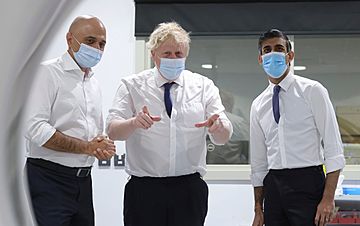
In June 2021, Javid returned to the Cabinet as Secretary of State for Health and Social Care. He took over during the COVID-19 pandemic. He supported ending most public health rules, like wearing face masks. He said people needed to learn to live with the virus, similar to how we live with the flu.
He also expanded the COVID-19 vaccination program. This included offering vaccines to healthy children aged 12 to 15.
On 5 July 2022, Javid resigned as Health Secretary. He said he could no longer support Prime Minister Boris Johnson. His resignation, along with Rishi Sunak's, led to many other ministers quitting. This caused a government crisis that ended with Johnson announcing his own resignation.
Political Views
Brexit
Javid's views on Europe have changed over time. In 1990, as a student, he was against Britain joining a European currency system. However, in the 2016 referendum, he supported remaining in the EU because he believed in the single market.
After the UK voted to leave, Javid said the result of the referendum must be respected. As a minister, he supported a "hard" Brexit, meaning the UK would not stay in the EU's single market or customs union.
Israel
Javid is a strong supporter of Israel. He has often spoken at events for the Conservative Friends of Israel. He has said that if he had to choose a country in the Middle East to live in, it would be Israel because of its freedom.
In 2019, he visited the Western Wall in Jerusalem, a holy site. He was the first senior British minister to do so in 19 years.
Personal Life
Javid married his wife, Laura King, in 1997. They have four children. His wife is a practising Christian, and Javid has said that Christianity is the only religion practised in their home. Although he was raised in a Muslim family, he is not a practising Muslim.
One of his brothers, Bas Javid, is a high-ranking police officer at Scotland Yard in London.
In the 2024 New Year Honours, Javid was made a Knight Bachelor for his political and public service. This means he is now known as Sir Sajid Javid.
Images for kids
-
Treasury minister Javid discussing payday lending with Jo Swinson at the Which? ministerial credit visit in 2013
-
Home Secretary Javid with Kirstjen Nielsen, U.S. Secretary of Homeland Security, May 2018
-
Javid meeting John Bolton, United States National Security Advisor, at 11 Downing Street in 2019
See also
 In Spanish: Sajid Javid para niños
In Spanish: Sajid Javid para niños
 | Janet Taylor Pickett |
 | Synthia Saint James |
 | Howardena Pindell |
 | Faith Ringgold |


